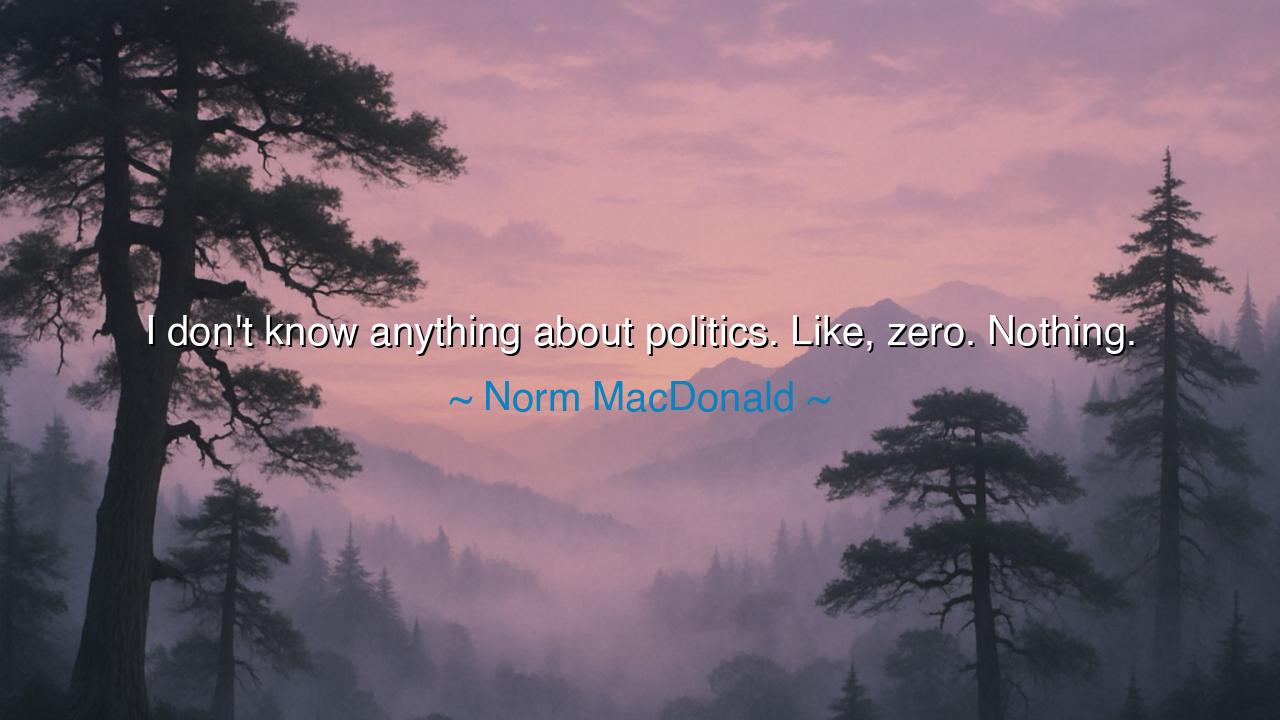
I don't know anything about politics. Like, zero. Nothing.






Hear, O seekers of laughter and truth, the words of Norm MacDonald, the jester-philosopher who clothed wisdom in humor: “I don’t know anything about politics. Like, zero. Nothing.” In this jest lies more than ignorance; it is a confession of humility and a subtle rebuke of pride. For in an age where many pretend to mastery, MacDonald chose honesty, admitting his distance from the tangled world of politics.
For the realm of politics is vast and murky, filled with speeches, promises, and intrigues. To say “I know nothing” is not only comic understatement, but also a mirror to the common soul. Most people, like MacDonald, feel estranged from the endless disputes of rulers, and in this estrangement lies both danger and wisdom. Danger, for ignorance can leave one vulnerable; wisdom, for it protects from arrogance and false certainty.
History offers parallels. Socrates, the great philosopher of Athens, declared that his only wisdom was that he knew nothing. Though surrounded by men who boasted of knowledge in statecraft, Socrates exposed their vanity by admitting his own ignorance. Like MacDonald, his confession of nothing was not weakness but strength: the strength to refuse pretense, and to laugh at the illusions of power.
Yet MacDonald’s words also carry the irony of the clown, who speaks lightly but reveals deep truths. By dismissing politics, he showed that one may still live meaningfully without claiming to master what few truly understand. His comedy, like the fool’s wisdom in Shakespeare’s plays, pierced through solemnity with humor, teaching that not knowing is sometimes closer to truth than pretending to know.
Therefore, let this lesson endure: in a world swollen with voices that claim expertise, there is honor in humility. To say “zero, nothing” may sound small, but it is a shield against pride and falsehood. MacDonald’s words remind us that laughter can strip the mighty of their illusions, and that wisdom sometimes dwells not in the knowing, but in the candid admission of not knowing at all.






NLNguyen Loan
MacDonald’s quote provides an interesting perspective on how politics is often viewed with frustration or indifference by many people. While his humor is disarming, it raises a valid question about political apathy: can you afford to be uninformed in a world where political decisions impact so much of our daily lives? Or does it highlight the need for a shift in how we educate and engage people in politics?
Bbucugianghoa
Norm MacDonald’s humor about politics might resonate with a lot of people who find themselves overwhelmed by the constant news cycle and political drama. But is it possible that this ‘ignorance is bliss’ approach only works if you're in a position of privilege? How does being uninformed about politics affect our collective decision-making as a society?
VTVu Thai
MacDonald's admission about not knowing anything about politics reflects a larger trend in society where many people feel detached from the political system. This raises the question: is this disconnection problematic? How can we make politics more accessible and relatable to everyday people who, like MacDonald, feel that it doesn’t really pertain to them?
DNNguyen Duc Nguyen
I appreciate how Norm MacDonald makes light of his own lack of political knowledge—it’s refreshing in a time when everyone seems to have an opinion about politics. But, in reality, do you think being politically unaware is a luxury that only some can afford? How much should we, as individuals, prioritize understanding politics, especially when it seems so disconnected from everyday life for some?
MKVo Minh Khoi
MacDonald's quote reflects a certain honesty about the complexities of politics, which can feel inaccessible to many. His admission raises an interesting point: should we all strive to be more informed about politics, or is it okay for people to focus on other aspects of life? In today’s environment, does being politically unaware come with consequences, or can it be a personal choice?